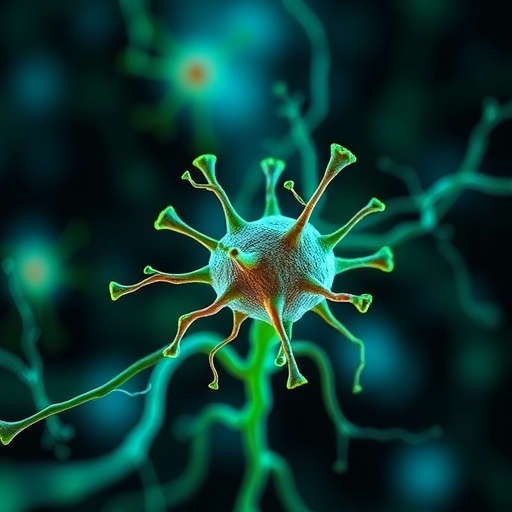As the human body ages, a gradual decline in nerve function manifests, particularly affecting the motor neurons responsible for muscle control. This natural deterioration, known as denervation, leads to slower nerve conduction velocities (NCV) and a reduction in muscle activation speed, contributing significantly to decreased mobility and an increased risk of falls among the elderly. However, groundbreaking research from Syracuse University suggests that targeted resistance training can effectively counteract this age-associated nerve degeneration, thereby enhancing muscle coordination and strength in older adults.
The interdisciplinary study, spearheaded by postdoctoral researcher Dr. JoCarol Shields and Professor Jason DeFreitas from the Department of Exercise Science at Syracuse University, employed a novel handgrip resistance training regimen to test its impact on NCV across a broad age spectrum. Enlisting 48 participants aged 18 to 84, the research investigated whether short-term, structured resistance exercise could stimulate reactivation of the fast motor neurons that typically deteriorate first with age.
The methodology involved measuring each subject’s nerve conduction velocity using precise electrophysiological tests. By stimulating the median nerve within the forearm and recording the latency and amplitude of muscle responses, the investigators obtained direct metrics of peripheral nerve function before and after a four-week handgrip training protocol conducted thrice weekly. Such measurements provide quantifiable insight into the speed and efficiency at which motor neurons transmit signals to muscle fibers, offering a window into neural health.
Results from the study underscored a striking enhancement in NCV among the elderly participants post-intervention. Where age had previously manifested as a marked decline in nerve signal transmission speed, the four-week resistance training reversed some of these deficits, suggesting neural plasticity extends into late adulthood. This likely arises from a process called reinnervation, where previously inactive or lost fast motor neurons reestablish connections with muscle fibers, restoring rapid force generation capabilities crucial for everyday tasks.
These findings hold profound implications for the prevention of falls and related injuries in seniors. Dr. DeFreitas emphasizes that the loss of fast motor neurons not only diminishes muscular power but critically impairs the ability to perform rapid corrective movements—such as recovering from slips or trips. Resistance training that reactivates these neurons can thus serve as a practical intervention to preserve neuromuscular function and maintain independence among aging populations.
Unlike prior assumptions that nerve function decline was largely irreversible, this study positions exercise as a potent tool to promote nerve regeneration or functional restoration. The neurophysiological evidence provided challenges the dogma surrounding aging nervous system plasticity, offering hope that modulation of peripheral nerve health is achievable through targeted physical activity paradigms.
Importantly, the research team utilized handgrip strength training—a simple, accessible, low-risk form of resistance exercise—as their intervention modality. Such exercises are feasible at home or in clinical settings, making their implementation scalable for wide populations. This pragmatic approach enhances the translational potential of the findings, aligning with public health goals to reduce disability and healthcare costs connected with aging-related falls.
Editorial commentary by Andrew Jones, Editor-in-Chief of Medicine & Science in Sports & Exercise, highlights the broader significance of these results. Not only do they establish the trainability of nerve function in aged adults, but they also open avenues for exploring resistance exercise as a countermeasure against nerve degradation arising from other etiologies, including neurodegenerative disorders and systemic diseases affecting peripheral nerves.
Future research directions outlined by the Syracuse team aim to expand understanding of the mechanisms underpinning exercise-induced reinnervation. They intend to examine whether similar benefits accrue in different muscle groups and whether extended or varied training protocols might amplify neural recovery. Additionally, molecular investigations into neurotrophic factor expression and synaptic remodeling are expected to shed light on the biological underpinnings of the observed functional improvements.
This investigation also embodies a collaborative, cross-institutional effort. In addition to Shields and DeFreitas, contributors include Claire Smith, a graduate research assistant at Syracuse University’s Falk College; Shawn Reese from Fairmont State University; Marcel dos Santos, an assistant professor at Illinois State University; and Maria Parodi, a master’s student at Oklahoma State University. The team’s multidisciplinary expertise was pivotal in designing rigorous protocols and interpreting complex neurophysiological data.
Funded partially through a Doctoral Research Grant from the Central States Chapter of the American College of Sports Medicine, the study underscores the vital role of institutional support in advancing aging-related health research. Its publication in Medicine & Science in Sports & Exercise situates the findings at the forefront of exercise physiology, gerontology, and neuroscience, fostering heightened awareness and potentially influencing guidelines for aging populations worldwide.
In summary, this research illuminates a promising path for mitigating age-related nerve decline through resistance training. By demonstrating that the peripheral nervous system retains a capacity for functional restoration, even in advanced age, the study advocates for the inclusion of strength-building exercises in senior healthcare regimens. Such a paradigm shift could empower older individuals to maintain muscle power, reduce fall risk, and sustain autonomy far longer than previously believed.
Subject of Research: Effects of resistance training on nerve conduction velocity and age-related nerve deterioration in humans.
Article Title: An Exercise Intervention May Counteract the Deterioration of Motor Neuron Function in Aging Adults.
News Publication Date: September 16, 2025.
Web References:
- Medicine & Science in Sports & Exercise
- Neural Health Research Laboratory at Syracuse University
- Department of Exercise Science, Syracuse University
References:
- DeFreitas, J., Shields, J.C., et al. (2025). An exercise intervention may counteract the deterioration of motor neuron function in aging adults. Medicine & Science in Sports & Exercise.
Image Credits: Syracuse University.
Keywords: Physical exercise, Gerontology, Human health, Public health, Health and medicine




